- Home
- Joel Rosenberg
Not Quite Scaramouche
Not Quite Scaramouche Read online
Not Quite
Scaramouche
Guardians Of The Flame
Book IX
Joel Rosenberg
First mass market edition: June 2002
First edition: January 2001
ISBN: 0-812-57470-2
Edited by Claire Eddy
Copyright © 2001
Tor Books
by Joel Rosenberg
Not Exactly the Three Musketeers
Not Quite Scaramouche
Not Really the Prisoner of Zenda
CONTENT
Dedication
Prologue
Part I: Biemestren
Chapter 1
Chapter 2
Chapter 3
Chapter 4
Part Two: Cullinane
Chapter 5
Chapter 6
Chapter 7
Part Three: Parliament
Chapter 8
Chapter 9
Chapter 10
Chapter 11
Chapter 12
Chapter 13
Chapter 14
Chapter 15
Chapter 16
Chapter 17
Part Four: Forinel
Chapter 18
Chapter 19
Chapter 20
Chapter 21
Chapter 22
Chapter 23
Chapter 24
Chapter 25
Chapter 26
Chapter 27
Afterword
Dedication
For Harry and Spring
always missed; never forgotten
Prologue
A Night in Biemestren
Pirojil liked the night. Yes, in part it was that the darkness hid his face – in large part – but there was more to it than that. After all, a mask could hide his face – although, under most circumstances, that would draw more attention than even his ugliness did – and a beard and mustache did just that at the moment
No, it wasn't just that it concealed his ugly face. Darkness was a comforting thing, a blanket of shadows and grayness that warmed him like a distant fire. With a quick motion of cloak and body, you could disappear into that darkness, or reach out from it with the steely finger of a sharp blade, darkened with lampblack.
Darkness offered detachment, both physical and emotional.
And detachment was a good thing in his line of work.
Nights in Biemestren were brighter than most; by edict of the lord warden, oil lamps flared brightly from just after sunset until just before sunrise in front of every commercial establishment along most streets, including the one that was officially named the Street of Pirondael's Treachery – the new emperor, or more likely his mother, had gone in for some serious renaming – but which, for reasons nobody seemed to be able to remember, was called Dog Street by all the natives. It was filled with lower-class establishments – taverns and bordellos that catered to the soldier trade, mainly.
Loud, drunken singing and a quartet of staggering Tyrnaelians poured out through the open door of the Tavern of the Broken Mug – at least, that was what Pirojil thought it was called, given that the emblem mounted at the edge of the roof was a mug fit for a mythical giant, with a jagged crack sawed down the side, still dripping water from the earlier rainstorm.
He took a battered leather eyepatch from his pouch and adjusted it about his left eye, tightening the thong hard behind his head to prevent any light from leaking in, then shrugged his cloak up to hide the Cullinane green and gold stitching on his collar and epaulets, and shouldered his way in, his left hand automatically going to the hilt of his sword to pull it vertical so that the tip didn't brush against anybody.
It made sense to be careful about that sort of thing. It would be easy to start a fight, and at times when he had nothing better to do he might do just that – he had, in the past, and he would again, some night where he needed to feel blood on his knuckles even if that meant tasting his own blood in his mouth – but he didn't want to do so accidentally, and for no purpose. If he wanted a fight this night, it would be easy to find a purpose.
The Broken Mug was a raucous and manically happy place. Over in the corner three drummers maintained a rhythmic beat that reminded Pirojil of a galloping horse, while a dozen Tyrnaelians belched out a song whose words Pirojil probably could have made out, if he had ever acquired a taste for porcine Tyrnaelian drinking songs, which he hadn't.
And wasn't bloody likely to. There wasn't enough beer in the world ...
The line of men in front of a curtained doorway moved quickly enough that Pirojil was sure there were at least three whores in the back room, and hoped it was at least four or five.
A quartet of imperials in the black-and-white of the House Guard kept dour watch over their mugs from a darkened far corner, carefully ignored by all and sundry. Baronial soldiers saw duty in the capital as an opportunity to drink and swive away their pay. Imperials lived there and expected – and demanded – better prices on everything.
Pirojil was sympathetic – in principle, but in practice you didn't save up enough money for your retirement by getting four-for-three on beers or whores. There were, however, ways to put aside a few coins here and there ...
He slid a copper quartermark coin across the bar and accepted a large mug of sour beer in return. He had had worse and he had had better. Good enough to get drunk on, and that would be fine for lonely men, late at night, and more than enough to boost the spirits of the four men in peasant's tunics who sat in front of a low table in the darkened corner farthest away from the fireplace.
Reading people came naturally to Pirojil. These four had come to the capital to sell something – and given that the harvest was many tendays away, it would be livestock, and a fair amount of it, or four men could not have been spared from their crofts long enough to make a trip to Biemestren and back. Pirojil could practically have counted the coin in their pouches.
Drinking and whoring up a bit of their profits was only natural, and as one blocky man rose to take his place in line in front of the curtain to the back rooms, an imperial soldier pushed out through the curtains and beckoned to his companions, who, despite a few grumbled complaints, quickly drained the last of their tankards, rose, and left.
Pirojil nodded to himself. Midnight was fast approaching, and while baronial soldiers would not likely have to put up with a nightly head count in the barracks, the imperials would be on duty the next morning or the next afternoon at the latest, and neither imperial decurions nor officers were noted for their understanding and sympathy at lateness. Or at anything else, for that matter.
As the imperials exited into the night, raucous laughter followed them. One started to turn back – putting up with mockery from Tyrnaelians was probably not something any of them cared for – but desisted when one of his fellows grabbed his arm and pulled him along. There were times to fight – and times not to be late.
With the last of the imperials through the door and out into the night, the speed and volume of the singing and drumming picked up instantly, as though the Tyrnaelians had been holding back out of respect for the stodginess of the departed soldiers. Pirojil muffled a grin.
One Tyrnaelian laughed loudly, raucously, and the cackling was picked up by the rest, as though to emphasize for the imperials that the real fun only began when local soldiers had to report back to their barracks.
A civilian, a well-muscled young man whose clean, well-tailored white linen tunic spoke of wealth, joined in the laughter, too loudly.
"A round of beer for my Tyrnaelian friends, if you please," he called to the innkeeper, his voice too loud still, his tone too familiar by half. At least.
"Friends, are we?" a thick-set Tyrnaelian answered, quietly
. He was a big man, half a head taller than his companions.
The silver bars on his collar points proclaimed him a decurion; the untarnished shine on them and the empty pitchers stacked on the table suggested that he was busy drinking up his promotion pay with some friends. This was, quite possibly, the last time he would be able to do that; that was one of the troubles with rank. After the first or fifth or thirty-fifth time he put his former drinking friends on extra duty, he would have to find himself new friends to do his drinking with. He would have to find himself some higher-class establishment to do his drinking in, as well: flashing his rank off-duty would turn out to be more trouble than it was worth, and he wouldn't be able to rub elbows with ordinary soldiers in this sort of dive without having to do that.
But let him enjoy tonight, at least for the moment. There was no possible harm in that. The lot of them were in well-worn but clean uniforms, and from that and the rate at which they were drinking and swiving up their pay, Pirojil guessed that they were being rotated out of the capital, and back to their barony. It didn't do to keep baronial troops too long away from home, and that was something that both the barons and the emperor agreed on, although likely for entirely different reasons.
The decurion more staggered than walked over to where the merchant sat, and plopped himself down in a chair. "Friends, you say," he said from around a sneer, his voice thick and slurred. "You will forgive me not recognizing the old companion you surely must be."
"No offense was intended, Decurion," the merchant said, quietly. "I've had a bit of luck in the markets of late, and I've always thought that to share the good luck is to plant more." He raised his tankard. "This good beer comes from grain that was planted – scattered across plowed fields as though it was simply thrown away – only to come back twenty- and thirty-fold.
"Why should it not be that way for a round of beer bought for soldiers of Baron Tyrnael? We're all in the same empire now. Yes, I'm a Holt, fealty-bound to Barony Keranahan, and you're part of the same army that raped and pillaged and burned its way across all of Holtun in general and Keranahan in particular," he said. "But that's all over now."
He smoothed a hand down the front of his tunic, as though emphasizing that he was dressed in fine linen, rather than the rough cotton and raw wool of their uniforms. "It's my pleasure to share with you just a small, a tiny, an unimportant portion of the wealth that my wise trading and good fortune have brought me." He spread his arms wide, as though he was about to embrace them all. "Could anything be more reasonable?"
The Tyrnaelian muttered something under his breath. Pirojil wouldn't have bet against the decurion throwing a punch or the beer tankard at the merchant – Pirojil didn't particularly care for his smarminess, himself – but perhaps the decurion's new rank had brought some caution with it: Instead, he rose, and taking away the merchant's tankard with a broad sweep of his arm, returned to his place, accompanied by the drunken, mocking comments of several of the soldiers in various parts of the tavern.
One of the decurion's companions muttered something about how he wouldn't have taken that shit, not off a nose-high Holt, not last tenday, and if the decurion's bars made him go this soft, well, shit, they were all in for some easy duty, and wasn't that grand.
The decurion just glared at his friends and at the merchant as the merchant shrugged at the wet circle on the table where his tankard had rested, and rose.
The merchant settled his debt with a flip of a coin to the tavern keeper and headed out the door into the night, pausing only to give the decurion a quick salute that was more than mildly insolent under the circumstances.
That did it. The decurion pulled one of his fellows close and whispered in his ear. The soldier rose, and Pirojil quietly drained the last of his own beer and followed him out into the night.
Pirojil switched the eyepatch from his left eye to his right, which brightened the night considerably. It would be less than ideal in a fight, of course, but being night-blind would be worse, in or out of a fight, and his right eye would adjust to the darkness soon enough.
The Tyrnaelian whistled a drunken ditty as he followed the merchant, as though to entertain himself. Pirojil took to the shadows, his cloak reversed, the taupe side out, as he followed the two down to the corner. The merchant and his follower continued up Dog Street
, while Pirojil moved swiftly into an alley between two wattle-and-daub buildings, and broke into a fast walk intended to eat up distance without drawing attention to himself by running. He pulled a soft cap from his belt and pulled it down over his ears, hiding the sloping forehead that added to his ugliness. From any distance at all, he would no longer be recognizable; he was just another bearded man in a cloak and a cap and, if you looked particularly closely, an eye-patch. Hardly uncommon in Biemestren, or anywhere else.
By the time his quick steps took him up the street then back across, the whistling had stopped, and a quartet of dark shapes had joined the single Tyrnaelian soldier.
The street – Pirojil didn't remember the name – was quiet hereabouts; the merchant had led his pursuers into a largely residential area, mainly consisting of two-story buildings housing lower-class laborers in conditions worse than even the roughest barracks. It was the sort of neighborhood where doors were barred from sunset to sunrise, and wise people avoided the night. Biemestren was the capital of the empire, and while there were benefits that came with empire, the constant flow of people in and out of the capital brought not just trade and wealth – although it certainly brought plenty of that – but crime and misfortune. You could sentence all the thieves you wanted to a tour of the copper mines, and dangle murderers from the gibbet like crabapples on a tree, and others would come to take their place, or be driven to.
Pirojil understood the temptation, after all.
The merchant threw a glance over his shoulder, and Pirojil didn't have to see the expression of alarm on his face to understand what the quickening of his pace meant, and as he broke into a trot, and then ducked into an alley, with a communal laugh the Tyrnaelian soldiers followed him.
The alley was barely lit by a lantern on a pole across the street, the flickering light reducing everything to shades of dark gray and black.
Pirojil removed his eyepatch. It was dark, but he had made his way through – and fought in – darker.
No windows opened on the alley, save for the shuttered ones on the second story. The ground was littered with detritus – a broken wagon wheel here, a jagged scrap of broken stone there. A carefully stacked pile of wood laths spoke of some construction project going on in one of the neighboring buildings – probably some landlord partitioning an already tiny apartment into two smaller ones.
But the alley terminated with a high fence, shards of glass plastered into its surface to prevent climbing.
Cornered, nowhere to go, the terrified merchant turned to face his pursuers, one arm outstretched, palm out, as though he could hold them all at arm's length if only he wished hard enough.
The decurion stood silently for a moment. "Not quite so bold with your language, are you now, my old, dear companion, are you? Not quite so eager to rub a few coppers together under our noses, eh?"
The soldiers shuffled forward slowly.
"Truly, I meant no harm," the merchant said. "I just wanted to, to – "
"You just wanted to ask for a beating," the decurion said. "You just wanted to show disrespect for Baron Tyrnael, and his house. You just wanted to – "
It was at that moment that he lunged at the merchant.
In principle, Pirojil approved. No matter how little you respected an adversary, it would make no sense to give him a chance to, say, get a small, hidden knife out and into play, and surely a merchant who carried money would have a knife on him somewhere.
They would just beat him thoroughly, strip him of his money and valuables, and then be gone in the morning, leaving behind nothing but bruises and empty accusations to fall on imperial ears. Armsmen had seen losers of fights before,
and this fellow was well-muscled enough that it would be at least credible that he had involved himself in a fight, rather than been the victim of a simple robbery.
And the bragging merchant was a Holt, to boot. While there were certainly a few notable exceptions, most of the imperial troops and armsmen were either native-born
Biemish or immigrants, and there was more than enough long-term hatred of Holtun and Holts to go around.
The only trouble with the decurion's lunge was that he went right through the merchant, as though the merchant simply wasn't there.
Things happened quickly after that.
A dark shape dropped down a line from the nearest roof, just after a silent explosion of light shone brightly, even though Pirojil had his hands firmly over his tightly closed eyes. It was more like the light was in his brain then in his eyes, although he was only barely dazzled as he dropped his cloak to one shoulder, and moved swiftly into the alley.
The silence was almost deafening: he could no more hear the shouts of the Tyrnaelians than he could his own breathing, or the pounding of his own heart that had always been the rhythmic accompaniment to a fight.
Coming from behind, he threw his cloak over the head of the nearest Tyrnaelian, then kicked the man next to him hard, up against the wall, slamming his elbow into the ribs of each in turn. The breath of the second man was warm and fetid in Pirojil's nostrils, but soundless.
Kethol had already made his way down his rope, had kicked the decurion once, hard, in passing, and in a move that Pirojil hadn't seen since Durine died, had grabbed hold of the hair of the two remaining men and brought their heads together so hard that they bounced.
That was when a shadow in a dark corner of the alley brightened momentarily, resolving itself into the shape of Erenor. Daintily, delicately, he looped a cord over the decurion's neck, then drew it tight with a quick snap of the wrist, securing the other end of the cord to the soldier's thumbs before proceeding on to the next man, and giving him the same treatment.

 The Road Home
The Road Home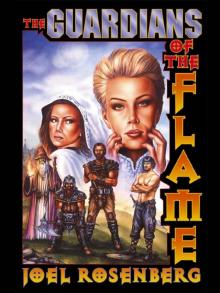 The Sword and the Chain
The Sword and the Chain Not Quite Scaramouche
Not Quite Scaramouche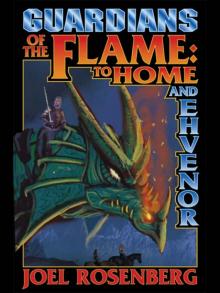 Guardians of The Flame: To Home And Ehvenor (The Guardians of the Flame #06-07)
Guardians of The Flame: To Home And Ehvenor (The Guardians of the Flame #06-07) The Silver Stone
The Silver Stone Hero
Hero Not For Glory
Not For Glory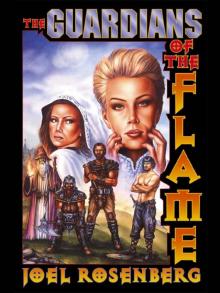 The Sleeping Dragon
The Sleeping Dragon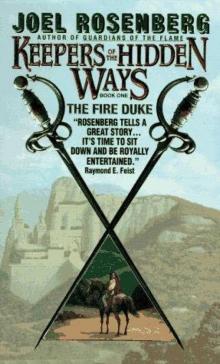 The Fire Duke
The Fire Duke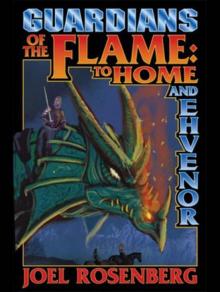 Guardians of The Flame: To Home And Ehvenor (Guardians of the Flame #06-07)
Guardians of The Flame: To Home And Ehvenor (Guardians of the Flame #06-07)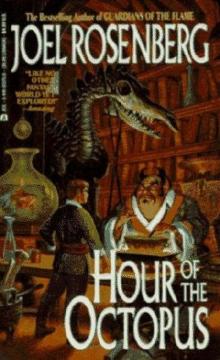 Hour of the Octopus
Hour of the Octopus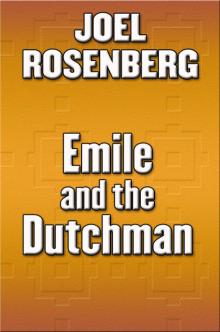 Emile and the Dutchman
Emile and the Dutchman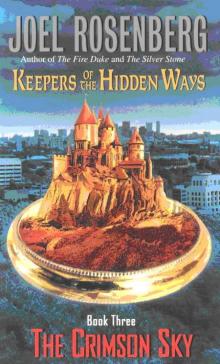 The Crimson Sky
The Crimson Sky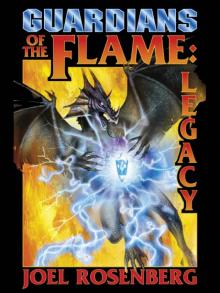 Guardians of the Flame - Legacy
Guardians of the Flame - Legacy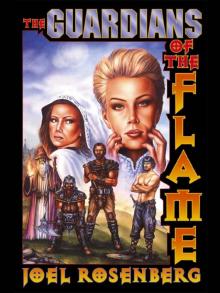 The Silver Crown
The Silver Crown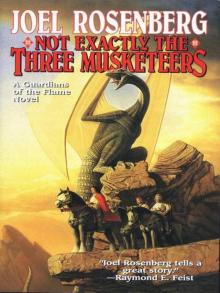 Not Exactly The Three Musketeers
Not Exactly The Three Musketeers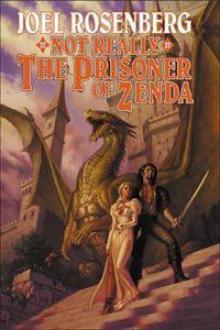 Not Really the Prisoner of Zenda
Not Really the Prisoner of Zenda